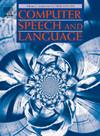Exploring knowledge distillation for low-resource multi-modal streaming ASR in the CHiME-8 MMCSG challenge
IF 3.4
3区 计算机科学
Q2 COMPUTER SCIENCE, ARTIFICIAL INTELLIGENCE
引用次数: 0
Abstract
In the CHiME-8 Multi-modal Conversational Speech Recognition for Smart Glasses (MMCSG) challenge, participants were tasked with achieving real-time transcription of two-person conversations recorded with smart glasses. To address the scarcity of real-world data, we propose a knowledge distillation framework where a non-streaming teacher model, trained on augmented multi-channel audio, guides a streaming student model. Leveraging simulated data with varying overlap rates, the framework employs a logit-based Kullback–Leibler divergence loss alongside mean square error losses on hidden states and attention maps of Fast-Conformer layers to transfer knowledge from the teacher to the student, significantly improving the performance of the audio-only streaming automatic speech recognition (ASR) model. Furthermore, we exploit the synergy and complementarity of inertial measurement unit and audio data by developing a novel multi-modal streaming ASR model. Meanwhile, cross-modal distillation is performed by adopting the non-streaming audio-only teacher to guide the streaming multi-modal student. Experimental results demonstrate that our proposed multi-modal fusion and teacher-student learning framework effectively enhance the performance of streaming ASR models. Notably, our approach secured the first place in the sub-track of the CHiME-8 MMCSG challenge.
在CHiME-8 MMCSG挑战中探索低资源多模态流ASR的知识蒸馏
在CHiME-8智能眼镜多模态会话语音识别(MMCSG)挑战中,参与者的任务是实现用智能眼镜记录的两人对话的实时转录。为了解决现实世界数据的稀缺性,我们提出了一个知识蒸馏框架,其中一个非流教师模型,在增强多通道音频上训练,指导流学生模型。利用不同重叠率的模拟数据,该框架采用基于逻辑的Kullback-Leibler散度损失以及Fast-Conformer层的隐藏状态和注意图上的均方误差损失,将知识从教师传递给学生,显著提高了纯音频流自动语音识别(ASR)模型的性能。此外,我们通过开发一种新的多模态流ASR模型,利用惯性测量单元和音频数据的协同和互补性。同时,采用非流化的纯音频教师对流化的多模态学生进行跨模态升华。实验结果表明,我们提出的多模态融合和师生学习框架有效地提高了流ASR模型的性能。值得注意的是,我们的方法在CHiME-8 MMCSG挑战赛的子赛道中获得了第一名。
本文章由计算机程序翻译,如有差异,请以英文原文为准。
求助全文
约1分钟内获得全文
求助全文
来源期刊

Computer Speech and Language
工程技术-计算机:人工智能
CiteScore
11.30
自引率
4.70%
发文量
80
审稿时长
22.9 weeks
期刊介绍:
Computer Speech & Language publishes reports of original research related to the recognition, understanding, production, coding and mining of speech and language.
The speech and language sciences have a long history, but it is only relatively recently that large-scale implementation of and experimentation with complex models of speech and language processing has become feasible. Such research is often carried out somewhat separately by practitioners of artificial intelligence, computer science, electronic engineering, information retrieval, linguistics, phonetics, or psychology.
 求助内容:
求助内容: 应助结果提醒方式:
应助结果提醒方式:


